Cryorig's R5, C7 Copper Coolers At Computex
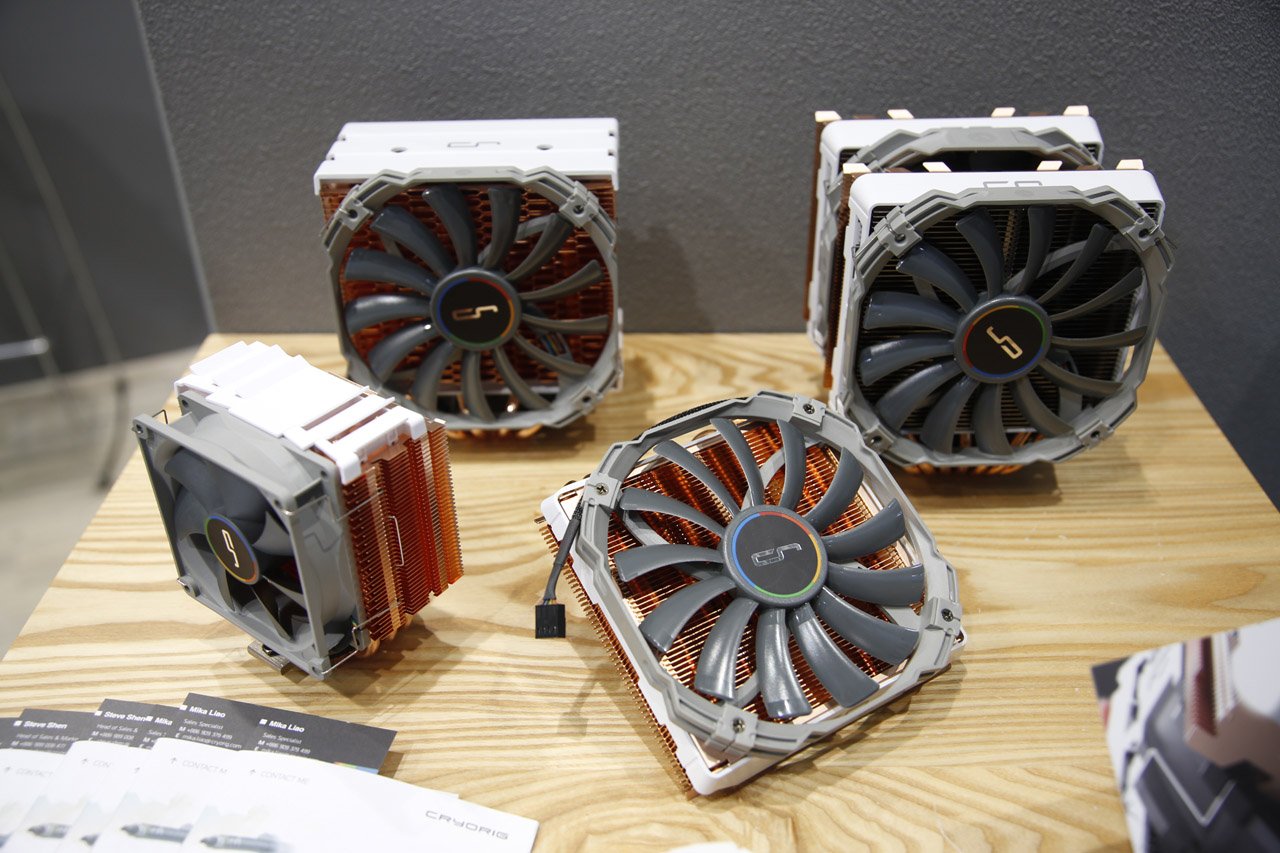
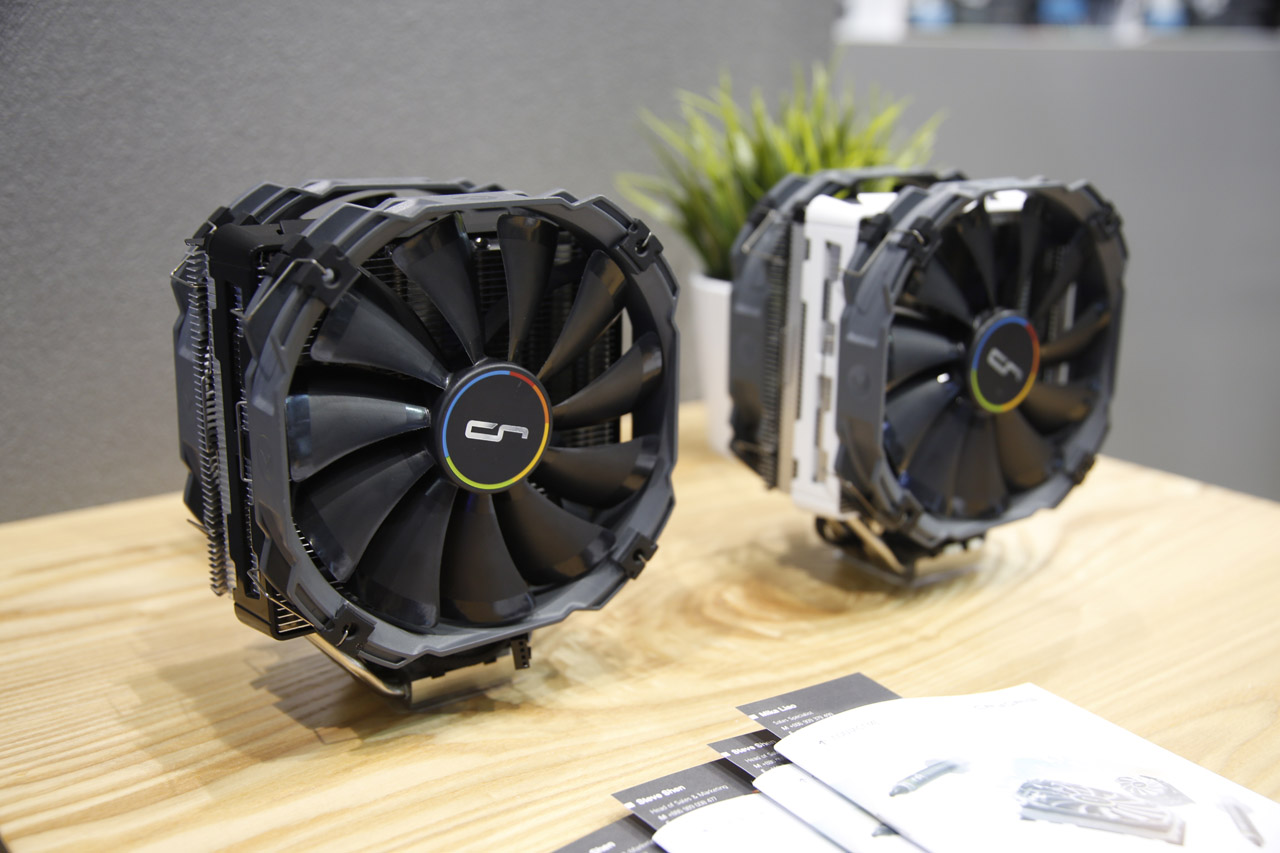
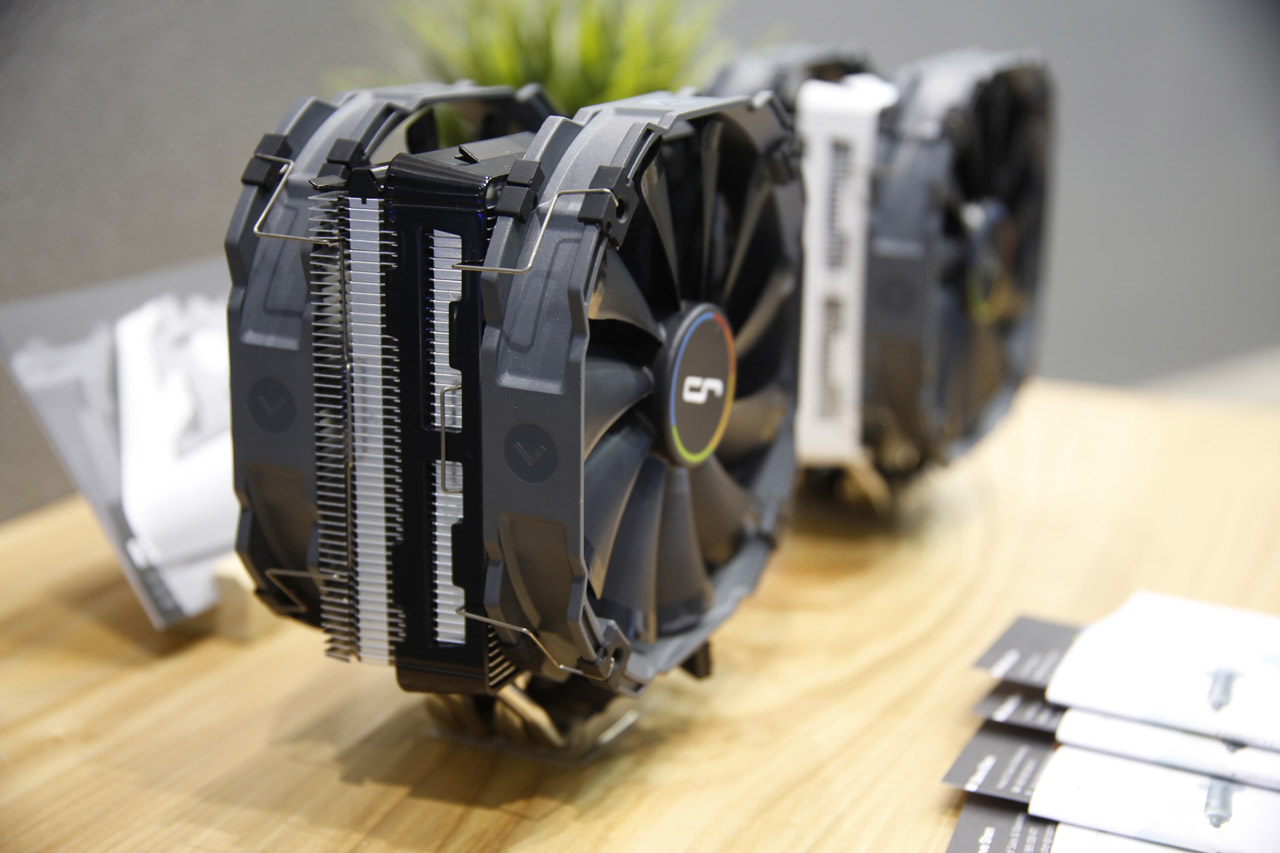
In addition to its Kickstarter case offering, Cryorig also announced a handful of new copper coolers at Computex 2017.
First is the Cryorig R5 high-end dual-fan, single tower, zero RAM interference CPU cooler. The R5 is specifically designed for maximum cooling performance with a focus on compatibility and RAM clearance--even on Intel's X99/X299 motherboards. Cryorig's flagship cooler utilizes two XF140 fans in a push/pull configuration. Air is channeled through the stacked aluminum fins bonded to six large copper heatpipes.
The company’s brand new Quick Lock Mounting will make its first appearance on the R5.
There’s also the company's new line of "Performance Edition" copper coolers. The overall concept is simple: Take some of your most popular CPU coolers and replace the aluminum fins with copper. When it comes to thermal dissipation, science tells us that copper is capable of cooling roughly 385 Watts per meter Kelvin (W/mK) at 20C compared to aluminum at 205W/mK at the same temperature.
This gives some credence to the company's claims that copper provides "roughly twice the heat conductivity compared to aluminum." So, at least in theory, this new line of copper coolers should provide better thermal dissipation compared to the aluminum units of the same design. The Cryorig C7 will be the first cooler to receive the updated copper design, with further products to be announced later.
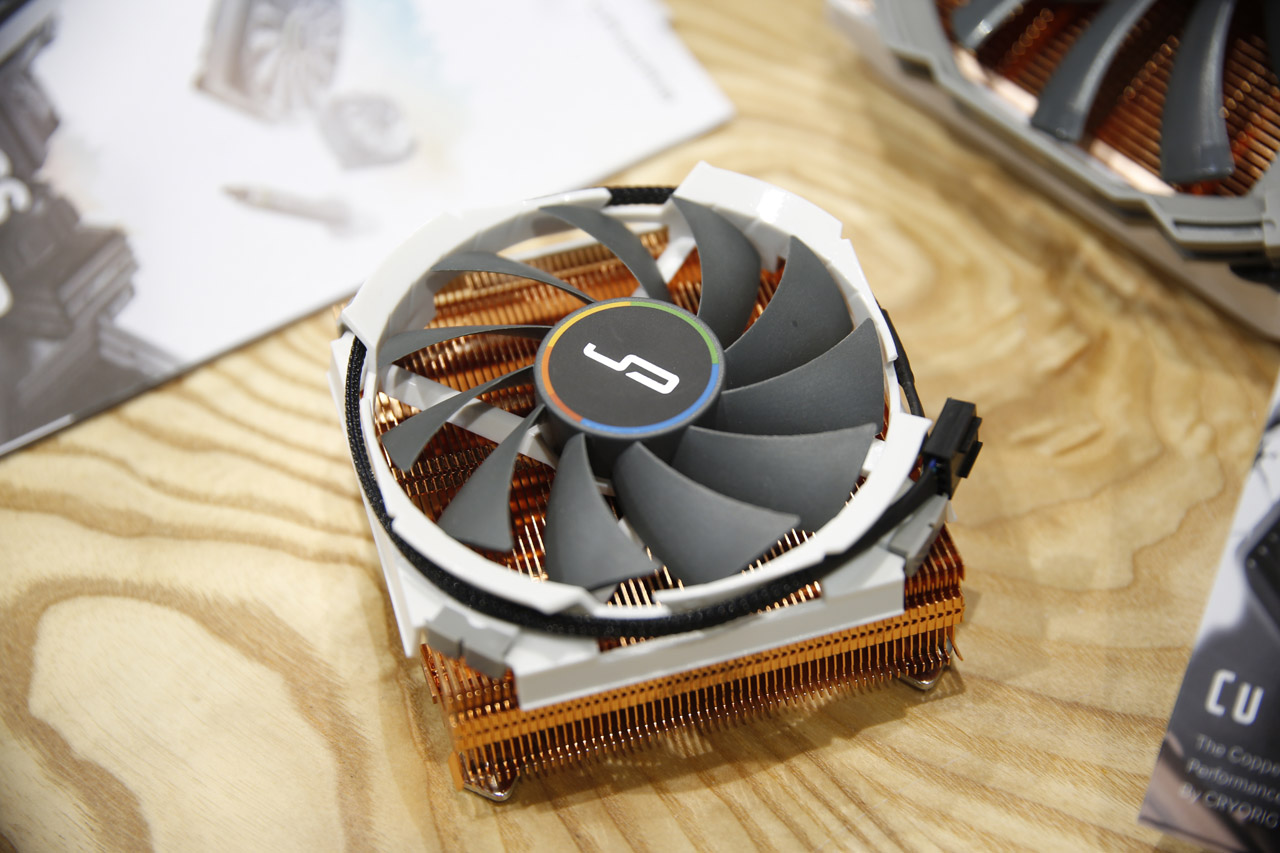
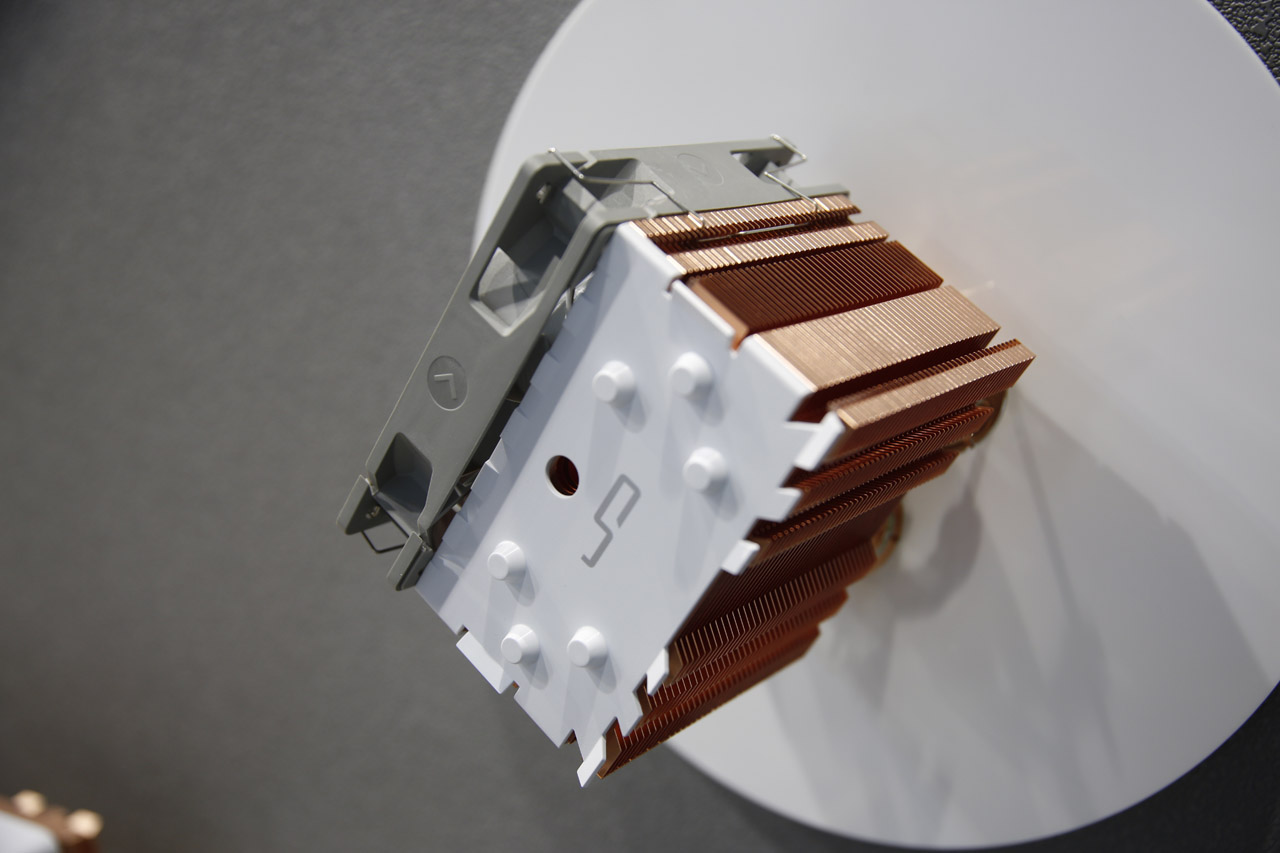
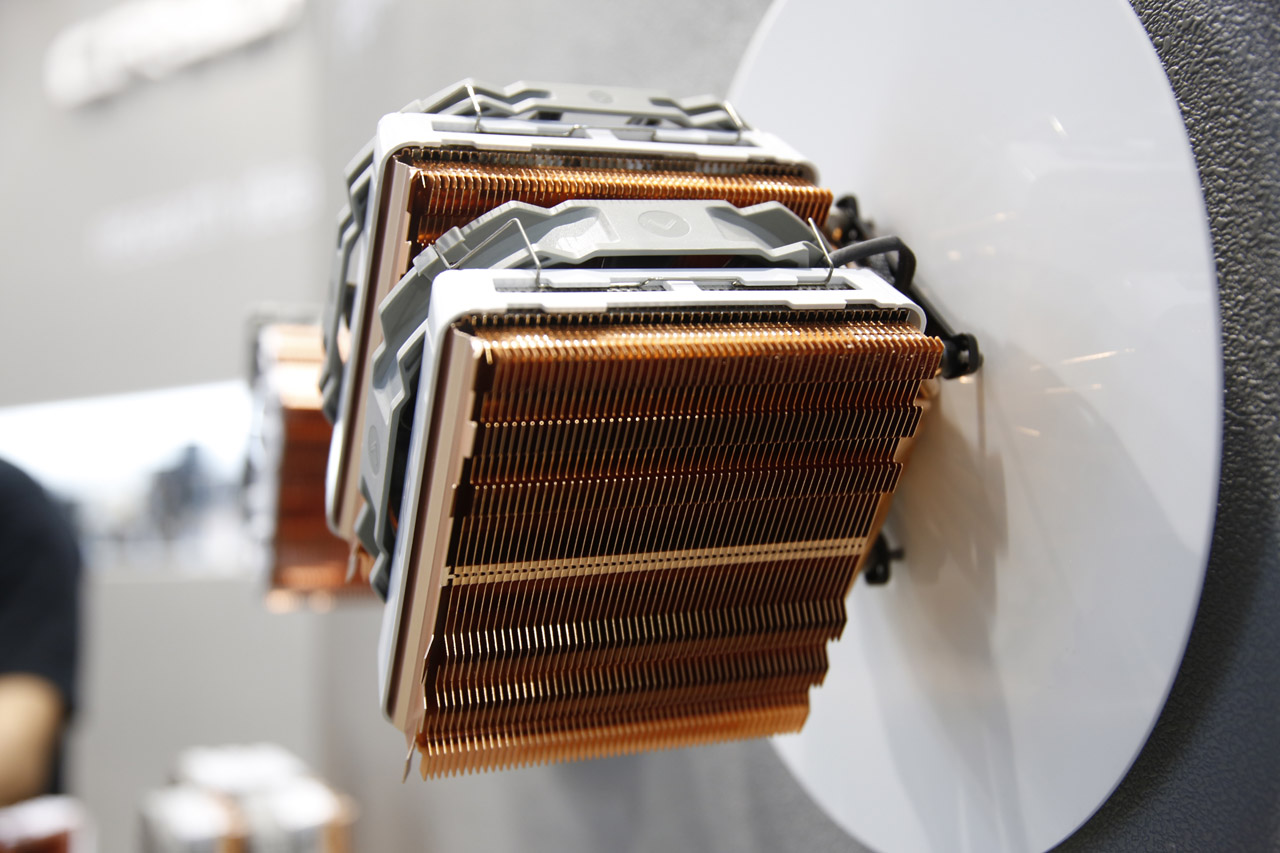
The obvious problem with copper is that not only is it heavier, it’s more expensive, as well. We'll have to wait until these coolers are available to know just how much the upgrade to copper will affect pricing.
Get Tom's Hardware's best news and in-depth reviews, straight to your inbox.
Steven Lynch is a contributor for Tom’s Hardware, primarily covering case reviews and news.
-
Lucky_SLS i would say it will be worth it for those 10+ cores 4.5ghz turbo boost skylake X CPUs.Reply -
Virtual_Singularity Excellent. Way to go Cryorig! They're one of the few companies in regards to air cooling that I've genuinely taken an interest in & I kind of wish I'd given more consideration to their coolers earlier.Reply -
JamesSneed I doubt they will cool much better(1-2c) since the prior coolers used copper base plates already. They do look kinda steampunk though so I'm sure some will want just for the looks.Reply -
Rookie_MIB I think they should offer some improvement, as while previous coolers use copper baseplates they only offer aluminum fins. Thus while the heat might transfer through copper better, once it hits the aluminum the heat transfer rate drops dramatically. The one thing that will need to be done though is make sure that there's a fan with sufficient flow to optimize for the higher heat. Because aluminum transfers heat slower, you actually have to have a slower fan so that the air has more time to absorb the heat by passing over the fins more slowly. With copper, and it's higher heat transfer rate, they might need a stronger fan for more airflow to get more heat out of the assembly. This could result in some higher noise levels, but if it performs at a higher rate it should be a worthwhile tradeoff.Reply
The problem hits with pricing though, specifically watercooling. You can now get a Fractal Celsius S24 for $100 and it'll outperform most aircoolers by a wide margin. The copper coolers will need to land safely between high end aluminum air coolers and low-mid level water coolers to have a chance. -
dstarr3 What we need is a Noctua L9i-killer. A heatsink and fan under 40mm in height, and can handle more than 65W TDP. I don't see any specs on the low-profile fan in photos here, but hopefully Cryorig can deliver. Because if someone could build that, almost regardless of expense, I'd pick it up in a heartbeat.Reply -
JamesSneed Reply19786115 said:I think they should offer some improvement, as while previous coolers use copper baseplates they only offer aluminum fins. Thus while the heat might transfer through copper better, once it hits the aluminum the heat transfer rate drops dramatically. The one thing that will need to be done though is make sure that there's a fan with sufficient flow to optimize for the higher heat. Because aluminum transfers heat slower, you actually have to have a slower fan so that the air has more time to absorb the heat by passing over the fins more slowly. With copper, and it's higher heat transfer rate, they might need a stronger fan for more airflow to get more heat out of the assembly. This could result in some higher noise levels, but if it performs at a higher rate it should be a worthwhile tradeoff.
The problem hits with pricing though, specifically watercooling. You can now get a Fractal Celsius S24 for $100 and it'll outperform most aircoolers by a wide margin. The copper coolers will need to land safely between high end aluminum air coolers and low-mid level water coolers to have a chance.
See this review from when Thermalright did the same thing. This is why I said 1-2c drop as that is what we have already seen when going from a copper base/heat pipe with aluminum fins to copper fins.
https://www.hardocp.com/article/2008/11/19/thermalright_ultra_extreme_copper_cpu_cooler_review/3 -
Copper transfers heat better, but also radiates it less than aluminium. That is why aluminium fins don't need as high speed fans, because they radiate faster than cooper, not because what RookieMib described.Reply
The current copper base aluminium fins is the best design we have. -
Rookie_MIB Reply19787934 said:See this review from when Thermalright did the same thing. This is why I said 1-2c drop as that is what we have already seen when going from a copper base/heat pipe with aluminum fins to copper fins.
https://www.hardocp.com/article/2008/11/19/thermalright_ultra_extreme_copper_cpu_cooler_review/3
Well, you are correct compared to some of the better coolers, but in that chart it also beats all the other coolers. Yes, by one or two degrees compared to the second best, but compared to the Intel Stock (overclocked) it destroyed it. Thus my point about price. If they can hit a reasonable price lower than water and split the difference between high end air and low end water, then it could be a good cooler to consider depending on your budget.
As always, best thing to do? Wait and see what price it comes out at and what the reviews say.
-
TJ Hooker Reply
When you say radiate, are you saying that aluminum actually radiates heat energy as EM radiation (infrared) more readily than copper? Do you have a source for that?19788365 said:Copper transfers heat better, but also radiates it less than aluminium. That is why aluminium fins don't need as high speed fans, because they radiate faster than cooper, not because what RookieMib described.
Otherwise, I don't see why aluminum would be better at dissipating heat to its surroundings than copper. -
JamesSneed Reply19791068 said:
When you say radiate, are you saying that aluminum actually radiates heat energy as EM radiation (infrared) more readily than copper? Do you have a source for that?19788365 said:Copper transfers heat better, but also radiates it less than aluminium. That is why aluminium fins don't need as high speed fans, because they radiate faster than cooper, not because what RookieMib described.
Otherwise, I don't see why aluminum would be better at dissipating heat to its surroundings than copper.
Physics on TH. :) Copper has a lower specific heat capacity which means it will get hotter than aluminum faster but its because it is conducting more heat not because it isn't able to dissipate more heat. Copper will also dissipate heat faster as well due to the lower specific heat capacity which of course makes it more ideal for a heat sink. With that said copper is almost 3 times more dense than aluminum which is where the "aluminum dissipates heat faster" comes from if you compare the same sized copper "thing" vs same sized aluminum "thing". If you compare the same mass instead of physical size copper wins hands down. If they make the fins on the heat sink thinner so the mass of the copper is close to the aluminum the copper will win in conducting and dissipating heat but the fins are the most efficient part on the heat sink already so it wont impact CPU cooing that much(1-2c).
Specific Heat Capacity: How much heat a material can hold before it's temperature rises. This is directly proportional to thermal resistance. "Specific" because it refers to a certain amount of the material, hence making the numbers comparable. It's measured in Joules per degrees C. Lower is better.
Al(s) 0.89
Cu(s) 0.38